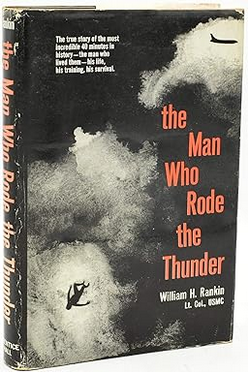In the latest addition to Mr. and Mrs. Psmith’s Bookshelf, John Psmith reviews The Man Who Rode the Thunder, by William H. Rankin:
Like many little boys, I loved learning lists of things. One day it was clouds. How could I not love them? The names were fluffy and Latinate, delicate little words like “cumulus” and “cirrus” that sounded like they might float away on a puff of wind. But there was also a structure to the words, intimations and hints of taxonomy. Was the relationship of an altocumulus to an altostratus the same as that of a cirrocumulus to a cirrostratus? I wasn’t sure, but it seemed likely! So here I had not just a heap of words, but something more like a map to making sense of a new part of the world.
So I learned the names of all the clouds, but I quickly got bored of most of them. Only one of them held my attention, but it made up for the rest by becoming an obsession. Yes, it was the mighty cumulonimbus, the towering, violent monster that heralds the approach of a thunderstorm. By then I had already met plenty of them — one of my earliest memories is of huddling with my mother in the room of our house that was farthest from any exterior walls, while lightning struck again and again and again, the echoes of the previous thunderclap still reverberating off the landscape when the next one began. What, I wondered, would it be like to be inside one?
There’s one man who knows. His name is Colonel William H. Rankin, and he fell through a thunderstorm and lived to tell the tale. After his ordeal Rankin published a memoir that was a bestseller in the early ’60s, but is out of print today. If you click the Amazon link at the top of this page, you will see that secondhand copies of the paperback edition go for about $150. If that’s too steep for you, I’m told that
Good Samaritanscommunists have uploaded high-quality scans of the book to various nefarious and America-hating websites, but this is a patriotic Substack and we would never condone that sort of behavior. Be warned!I sought out and read Rankin’s memoir for the part where he falls through a cloud, so I was planning on skimming and/or skipping the hundred or so pages where he narrates his life and career up to that point. When I actually cracked open the
They say you should read books to broaden yourself, to learn about foreign peoples and about cultures not your own. I was unprepared for late 1950s America being as foreign as it turned out to be. There’s a whole genre comprised of parodying the supposed mid-century American combo of sunny faith in scientific progress, squeaky-clean public morality, and blithe indifference to the horrors of industrial warfare. In my own reading and watching, I had only ever encountered the parodies, never the genuine article, until I read this book. Rankin’s memoir exudes gee-whiz enthusiasm from every pore. He is patriotic without a trace of irony, giddy as a schoolboy about advances in jet propulsion, and then uses a totally unchanged tone of giddiness and enthusiasm to describe melting hundreds of Korean peasants with napalm.
Reading this stuff fills me with the same feeling of vertigo that I get reading about Bronze Age Greek warriors — here is a human being just like me, but inhabiting a cultural, spiritual, and memetic universe so different from mine. Are we the same species? If we were to meet each other would we even be able to communicate? Or perhaps every age has had people like him and people like me, and all that’s changed is that the dominant mode of social interaction shifted from favoring one of us to the other. After all, I know people today who are incapable of irony or reflection. For instance, TSA agents. Was 1950s America an entire society of TSA agents? And if so, what am I to make of the fact that in so many ways it seems to have been more functional than America today?




